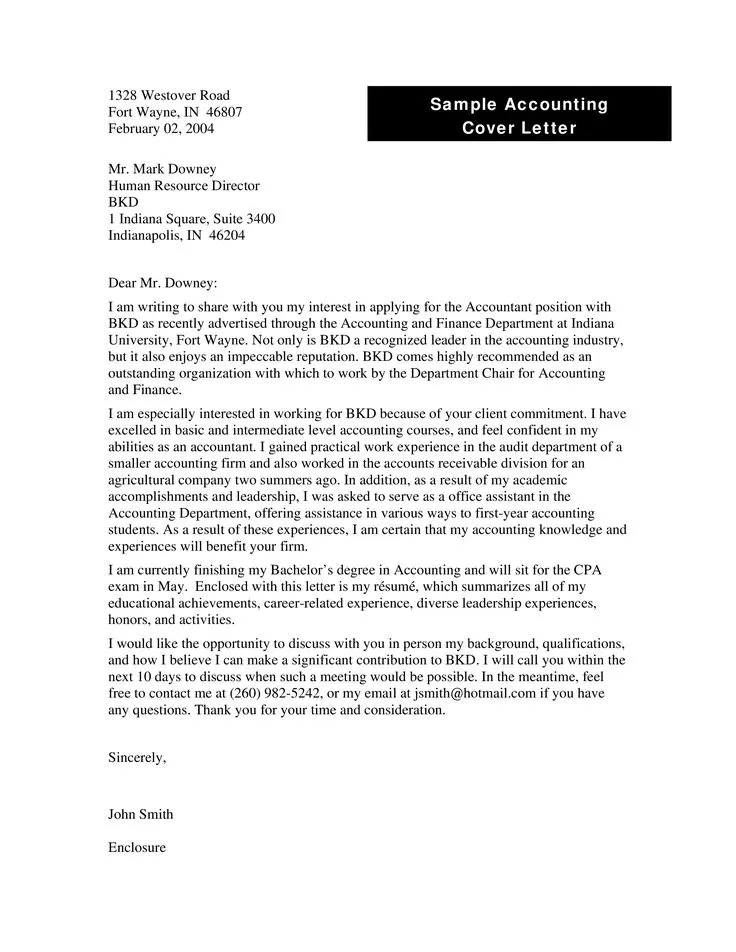Accounting Cover Letter Secrets Unveiled
In the competitive world of accounting, a well-crafted cover letter can be your secret weapon. It’s your first impression, your opportunity to shine beyond the resume, and your chance to convince a potential employer that you’re the perfect fit. Many job seekers underestimate the power of a compelling cover letter, seeing it as a mere formality. However, a strategic and well-written cover letter can significantly boost your chances of landing an interview, showcasing your personality, passion, and suitability for the role in a way that a resume alone cannot. This guide unveils the secrets to writing an accounting cover letter that gets noticed.
Understanding the Purpose of an Accounting Cover Letter
The primary purpose of an accounting cover letter is to introduce yourself and express your interest in a specific position while providing context and personality to your qualifications. It’s not just a summary of your resume; instead, it’s a narrative. It allows you to explain why you’re a strong candidate, how your skills align with the job requirements, and what unique value you bring to the table. It allows you to connect with the hiring manager on a more personal level, demonstrating your enthusiasm and explaining any potential gaps or career shifts in your professional journey. Properly utilized, a cover letter can set you apart from the crowd and make your application stand out.
Why a Great Cover Letter Matters for Accountants
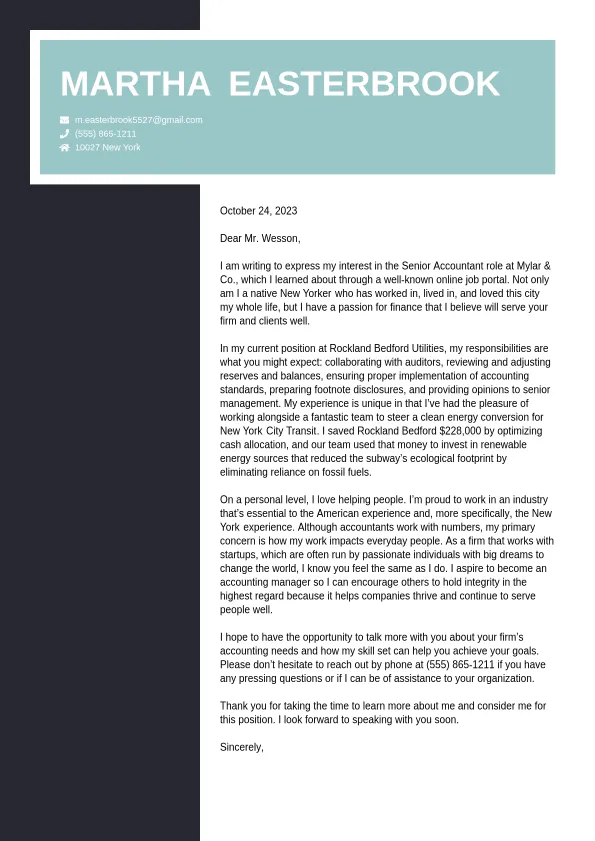
Accountants deal with precision and details, and your cover letter is a testament to your professionalism. It demonstrates your communication skills, attention to detail, and ability to present information clearly and concisely. A well-written cover letter assures employers that you possess the necessary skills to excel in their accounting roles. In an industry where accuracy is critical, an error-free and well-structured cover letter reinforces your reliability. It also provides an excellent opportunity to address specific job requirements and tailor your qualifications to the employer’s needs, ultimately increasing your chances of getting an interview. A cover letter should not be taken lightly.
Key Components of a Successful Accounting Cover Letter
A successful accounting cover letter incorporates several key elements, all working together to make a strong impression. This includes your contact information, a professional salutation, a compelling opening paragraph, well-structured body paragraphs highlighting relevant skills and experiences, and a strong closing statement. Each section of your cover letter should serve a specific purpose, demonstrating your qualifications, showcasing your personality, and clearly expressing your interest in the position. The content should be tailored to the specific job, demonstrating that you have done your research and are a serious contender. Proper formatting, including clear language and a professional tone, is also crucial. Finally, proofreading is essential to ensure your cover letter is polished, error-free, and ready to impress.
Contact Information and Professional Formatting
Begin your cover letter with your full name, address, phone number, and email address. This should be neatly aligned at the top, similar to how you would format a formal business letter. Choose a professional font like Times New Roman, Arial, or Calibri in a readable size (11 or 12 points). Ensure consistent spacing throughout the document for a clean, easy-to-read layout. Maintain a standard margin (1 inch on all sides) to provide space for readability. Avoid flashy fonts or excessive formatting; keep the design simple and focused on the content. Proper formatting showcases your attention to detail and organizational skills, which are highly valued in accounting. The overall presentation should be clean, professional, and easy for the hiring manager to review.
Crafting a Strong Opening for Your Cover Letter
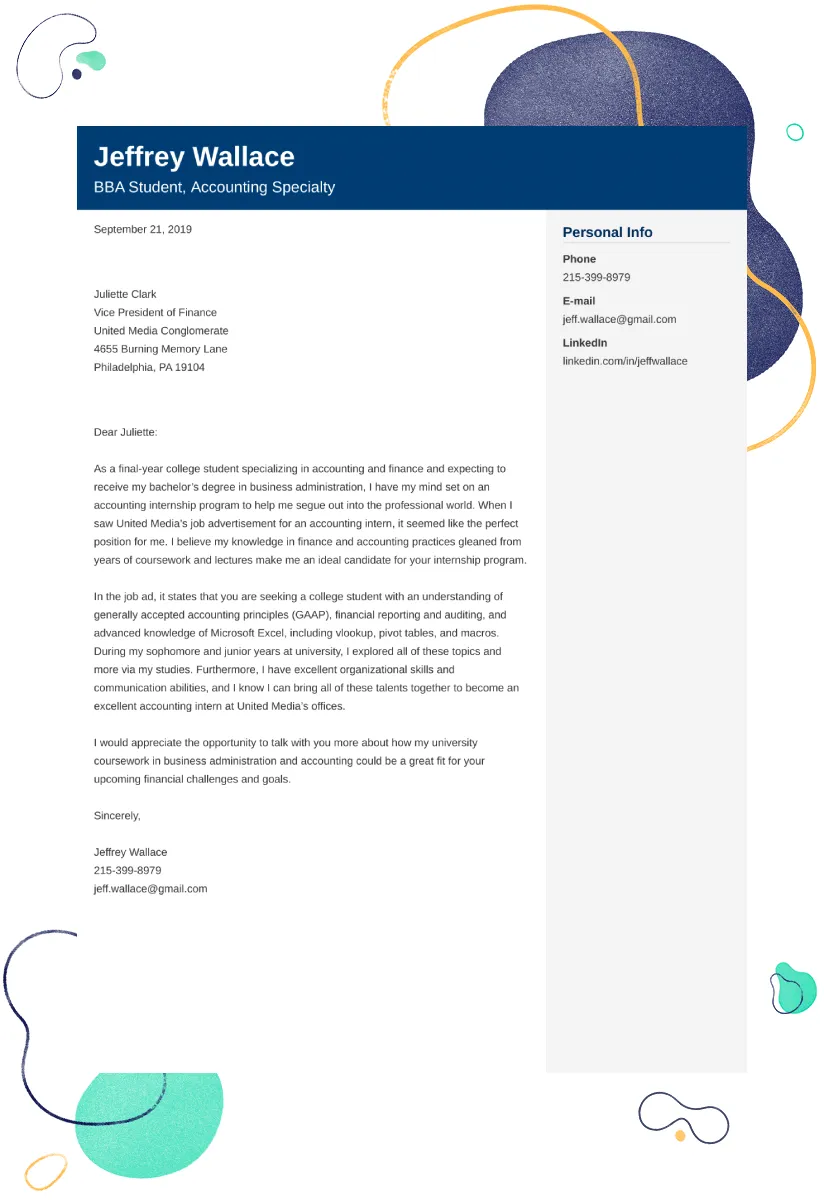
The opening paragraph is crucial to grab the hiring manager’s attention. Instead of a generic greeting, aim to make a strong first impression. Mention the specific position you’re applying for and, if possible, how you found the job posting. Show enthusiasm for the company or the role. Briefly highlight your most relevant qualification or an achievement that aligns with the job requirements. This opening statement should set the tone for the rest of the letter, instantly conveying your understanding of the role and demonstrating your enthusiasm. Personalize your opening to make it memorable. This is your chance to demonstrate that you have the skills and experience needed to excel in this position. The introduction should capture the reader’s attention.
Highlighting Your Skills and Experience
The body paragraphs should showcase your accounting skills and relevant experience. Focus on specific accomplishments rather than just listing responsibilities. Use the job description as a guide and tailor your experiences to match the requirements. Provide concrete examples of how you have used your skills to achieve positive results. Mention any software, tools, or methodologies you’re proficient in. Quantify your achievements whenever possible. For example, specify how you improved efficiency, reduced costs, or streamlined processes. Show that you are knowledgeable and skilled in all required areas. This will help hiring managers see you as a practical asset to the team. Make sure the information is clear, concise, and demonstrates your expertise.
Quantifying Your Achievements in Accounting
Numbers speak volumes in the world of accounting. Instead of stating you ‘improved efficiency,’ quantify your achievements by saying you ‘increased efficiency by 15%.’ Use metrics, percentages, and dollar amounts to showcase your impact. For example, ‘Successfully managed accounts payable, resulting in a 10% reduction in late payment penalties’ or ‘Developed a new budgeting system that reduced reporting time by 20%.’ Numbers provide objective evidence of your abilities and show the value you can bring to the role. Highlighting these quantifiable results makes your accomplishments more credible and provides a clearer picture of your successes. Make your accomplishments pop out.
Showcasing Your Knowledge and Industry Insight
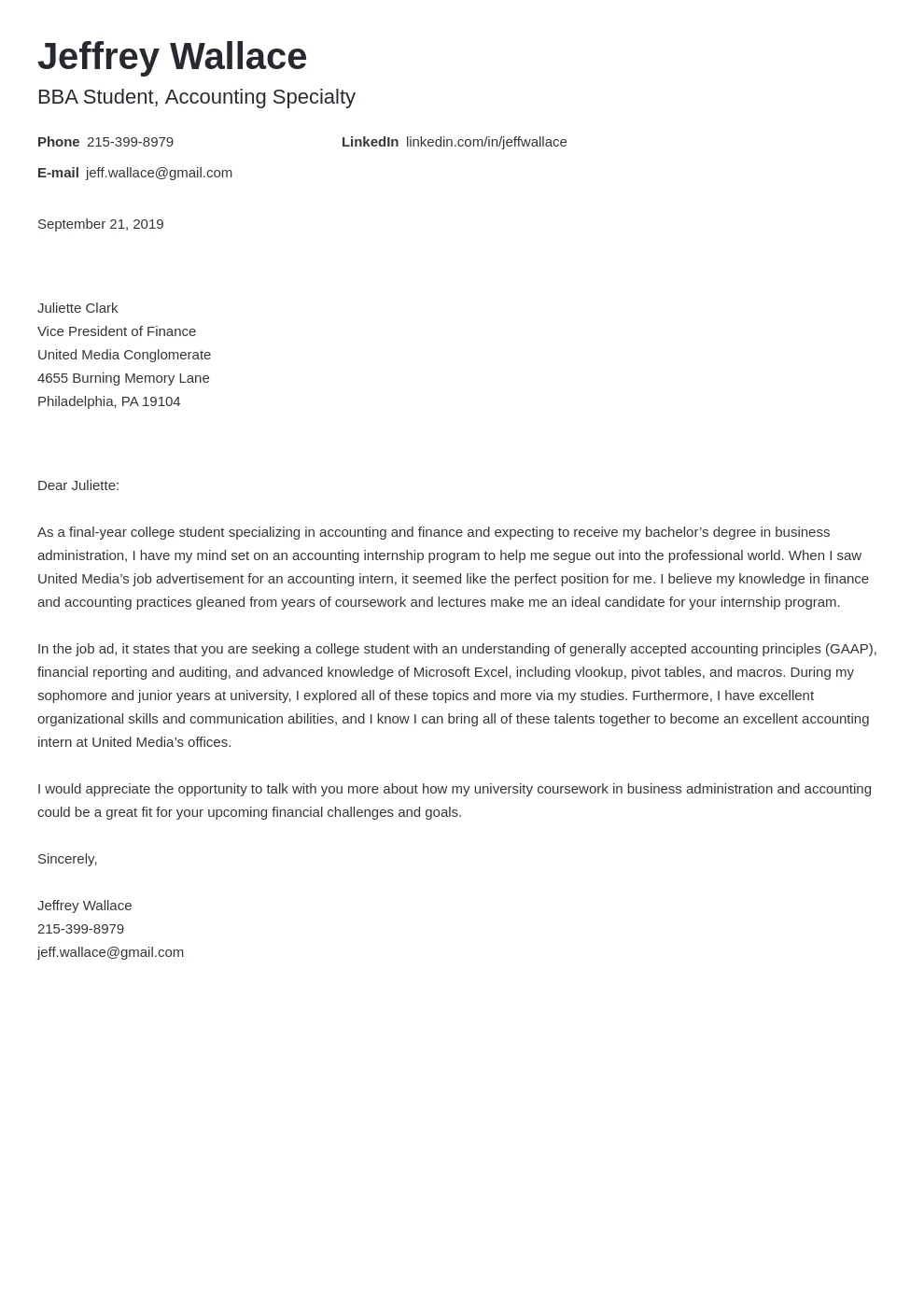
In addition to technical skills, demonstrate your knowledge of accounting principles, industry trends, and relevant regulations. Mention any specialized knowledge you possess, such as experience with specific accounting software or compliance requirements. Show that you are aware of the industry landscape, current challenges, and opportunities. This demonstrates that you stay updated with changes and demonstrates your commitment to the profession. You can share insights on how you’d apply your knowledge to the role. This section is about demonstrating that you are more than just skilled and knowledgeable. You are informed and always looking to be a contributor to the industry.
Tailoring Your Cover Letter to the Job Description
Avoid sending a generic cover letter. Customization is key. Review the job description carefully and identify the key skills, experiences, and qualifications the employer is seeking. Then, align your cover letter content to those specific requirements. Provide examples that directly address the needs outlined in the job posting. This not only shows that you’ve read the job description but also that you understand what the employer values. Personalize your letter by mentioning the company’s name and the specific role. This makes your application feel more personal and shows that you are genuinely interested. The perfect cover letter is written for one specific job.
Keywords and Applicant Tracking Systems (ATS)
Many companies use Applicant Tracking Systems (ATS) to screen applications. To ensure your cover letter gets noticed, incorporate keywords from the job description. Identify the key terms and phrases used by the employer and include them naturally throughout your letter. Focus on technical skills, software, and specific accounting practices mentioned in the job posting. This will help your cover letter pass the ATS scan and reach the hiring manager. While keywords are important, ensure your letter reads naturally and remains focused on your accomplishments. Avoid keyword stuffing, as this can make your letter sound unnatural.
Writing a Compelling Closing Statement
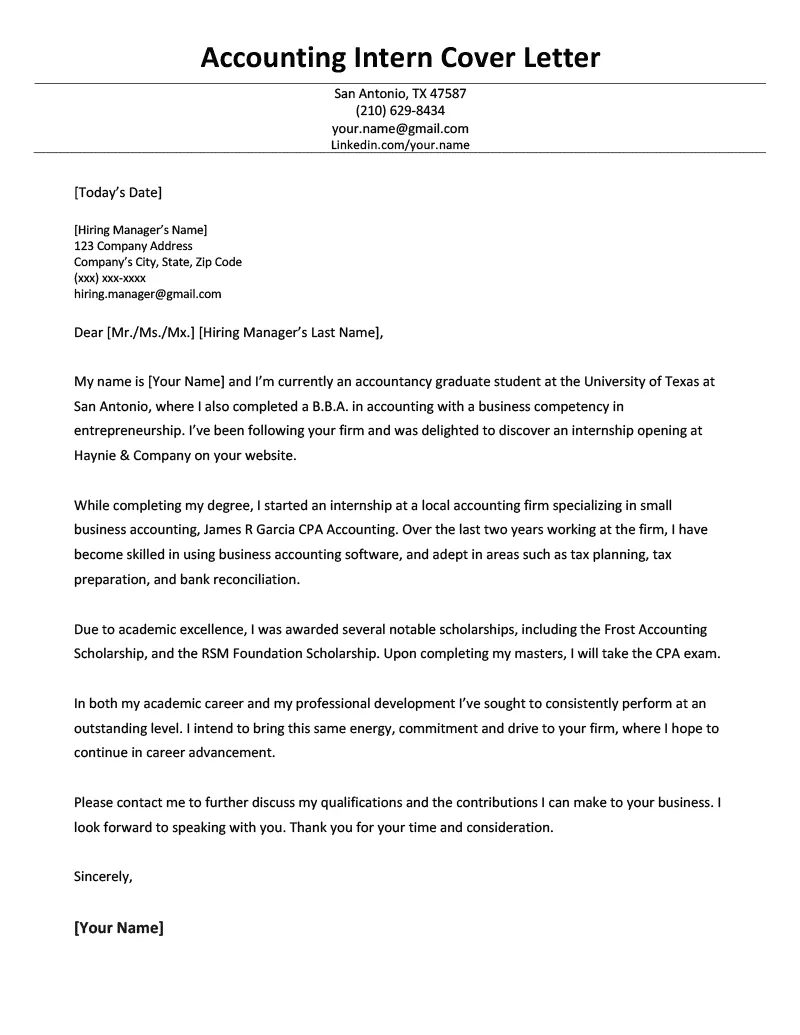
The closing statement is your final opportunity to leave a lasting impression. Reiterate your interest in the position and summarize why you are a great fit. Express confidence and enthusiasm while also conveying a sense of professionalism. State your availability for an interview and thank the hiring manager for their time and consideration. Make sure your closing is clear, concise, and aligned with the tone of the rest of your cover letter. Do not leave a generic closing; be direct, professional, and positive. Include a call to action, such as an invitation to contact you to discuss your qualifications further.
Proofreading and Editing Your Cover Letter
Thorough proofreading is essential. Errors in your cover letter can undermine your credibility. Review your cover letter for any spelling, grammar, and punctuation errors. Ask someone else to read your cover letter to identify any mistakes you may have missed. Check the layout and formatting to make sure everything is consistent and professional. Ensure the tone of your cover letter is professional and matches the job requirements. This ensures that your cover letter is polished, professional, and reflects your attention to detail. Proofreading is a crucial step that many candidates overlook.
Common Mistakes to Avoid in Your Accounting Cover Letter
Avoid common pitfalls that can damage your application. Refrain from generic greetings or an overused opening. Do not simply reiterate your resume; instead, provide additional context and insights. Do not make your cover letter too long; keep it concise and to the point. Ensure you avoid typos, grammatical errors, and inconsistencies. Don’t forget to tailor the cover letter to each job; avoid sending a generic letter. Do not include irrelevant information. Proofread carefully before sending your cover letter. Failing to address these can significantly impact your chances of success. Avoiding these mistakes allows you to make a positive impression and increase your odds of getting an interview.
Formatting and Presentation Tips for Accountants
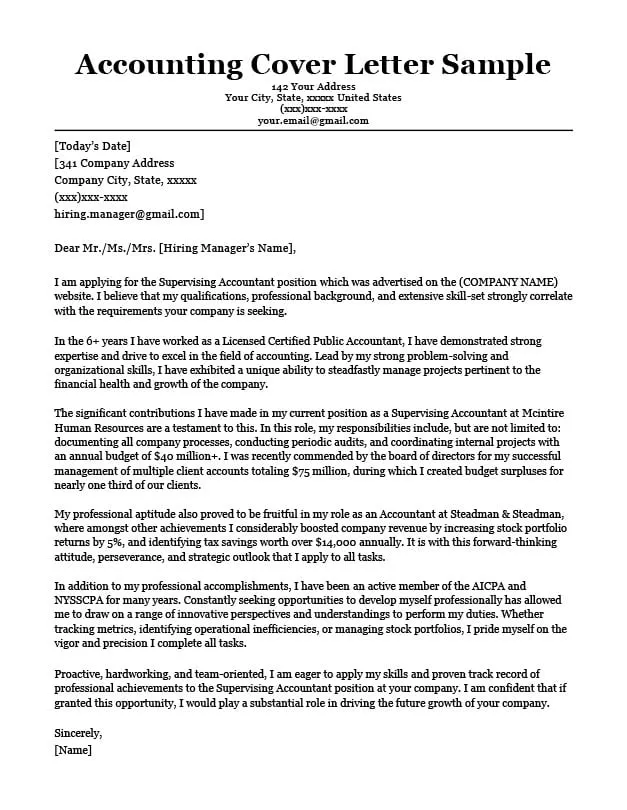
Proper formatting is critical for an accounting cover letter. Use a professional font, such as Times New Roman, Arial, or Calibri, at a readable size (11 or 12 points). Ensure consistent spacing and margins (1 inch on all sides). Use clear headings and bullet points to organize your content and make it easy to read. Keep your paragraphs concise and to the point. Avoid excessive formatting or flashy designs. The presentation should be clean, professional, and easy for the hiring manager to review. Make sure your cover letter is easy to read. Formatting and presentation showcase your attention to detail and professionalism, which are vital in the accounting field.
Cover Letter Examples for Different Accounting Roles
The content and emphasis of your cover letter should be tailored to the specific accounting role you are applying for. For instance, a cover letter for a Staff Accountant should highlight skills in financial reporting, account reconciliation, and general ledger maintenance. If you’re applying for a Senior Accountant role, focus on experience in financial analysis, process improvement, and team leadership. When applying for a role in auditing, emphasize your knowledge of auditing standards, risk assessment, and experience conducting audits. Research the specific requirements of each role and tailor your cover letter to showcase relevant skills and experiences. You should always customize your cover letter to fit the specific job. There are many cover letter examples available online.
Cover Letters for Entry-Level Accounting Positions
For entry-level accounting positions, your cover letter should emphasize your academic background, any relevant internships or volunteer experiences, and your eagerness to learn. Highlight your understanding of fundamental accounting principles, your proficiency with relevant software, and your strong communication and analytical skills. Even without extensive professional experience, focus on any projects, coursework, or extracurricular activities that demonstrate your aptitude and commitment to accounting. Show your enthusiasm for the role and your willingness to contribute to the company. Include skills from your education and internships. Make sure you come across as a dedicated professional.
Cover Letters for Experienced Accounting Professionals
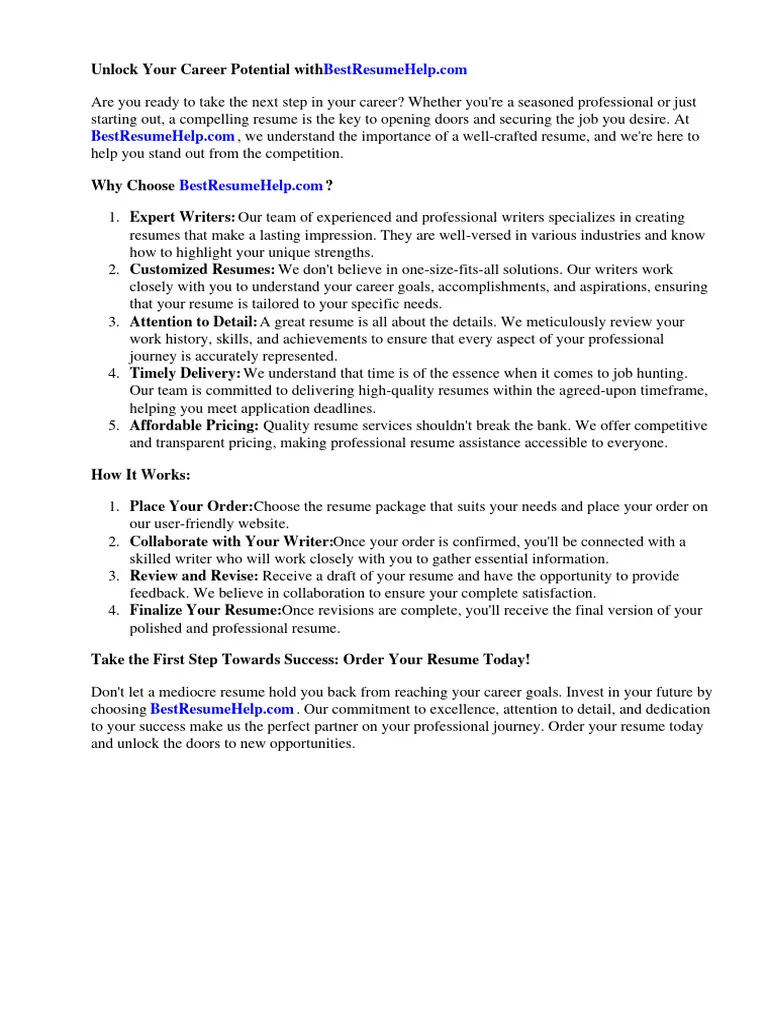
Experienced accounting professionals should emphasize accomplishments, quantifiable results, and leadership experience. Highlight significant achievements in your previous roles, such as process improvements, cost savings, or successful project implementations. Showcase your expertise in specific accounting areas, such as financial reporting, budgeting, or tax compliance. Include experiences in a team environment, and mention your leadership skills. Highlight your ability to mentor and develop junior staff. Tailor the cover letter to the specific role you’re targeting, showcasing your ability to meet the requirements of the position. Make sure to include information that highlights your leadership experience.
Following Up After Submitting Your Cover Letter
After submitting your cover letter and resume, follow up with the hiring manager or recruiter. Send a polite email or make a phone call within a week or two of submitting your application. Reiterate your interest in the position and briefly summarize your qualifications. This shows your enthusiasm and initiative. Use the opportunity to reiterate why you’re interested in the role. You can ask about the timeline for the hiring process. Follow-up shows you are serious about the opportunity and can leave a positive impression. This extra effort might just give you the edge.
